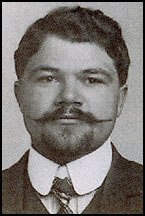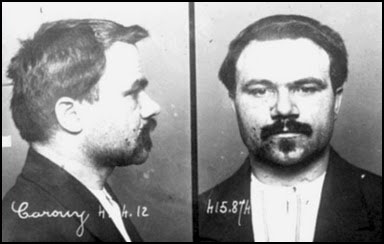Édouard Carouy

Édouard Carouy was born in Lens-sur-Deudre, Belgium, on 28th January, 1883. His mother died when he was three-years-old. He moved to Paris where he worked in a factory. He also associated with a group of anarchists.
Jules Bonnot arrived in the city in 1911. According to Victor Serge: "From the grapevine we gathered that Bonnot... had been traveling with him by car, had killed him, the Italian having first wounded himself fumbling with a revolver." Bonnot soon formed a gang that included local anarchists, Carouy, Raymond Callemin, Octave Garnier, René Valet, André Soudy and Stephen Monier. Serge was totally opposed to what the group intended to do. Callemin visited Serge when he heard what he had been saying: "If you don't want to disappear, be careful about condemning us. Do whatever you like! If you get in my way I'll eliminate you!" Serge replied: "You and your friends are absolutely cracked and absolutely finished."
These men shared Bonnot's illegalist philosophy that is reflected in these words: "The anarchist is in a state of legitimate defence against society. Hardly is he born than the latter crushes him under a weight of laws, which are not of his doing, having been made before him, without him, against him. Capital imposes on him two attitudes: to be a slave or to be a rebel; and when, after reflection, he chooses rebellion, preferring to die proudly, facing the enemy, instead of dying slowly of tuberculosis, deprivation and poverty, do you dare to repudiate him? If the workers have, logically, the right to take back, even by force, the wealth that is stolen from them, and to defend, even by crime, the life that some want to tear away from them, then the isolated individual must have the same rights."
Richard Parry, the author of the The Bonnot Gang (1987) has argued: "The so-called 'gang', however, had neither a name nor leaders, although it seems that Bonnot and Garnier played the principal motivating roles. They were not a close-knit criminal band in the classical style, but rather a union of egoists associated for a common purpose. Amongst comrades they were known as 'illegalists', which signified more than the simple fact that they carried out illegal acts. Illegal activity has always been part of the anarchist tradition, especially in France."
On 21st December, 1911 the gang robbed a messenger of the Société Générale Bank of 5,126 francs in broad daylight and then fled in a stolen Delaunay-Belleville car. It is claimed that they were the first to use an automobile to flee the scene of a crime. As Peter Sedgwick pointed out: "This was an astounding innovation when policemen were on foot or bicycle. Able to hide, thanks to the sympathies and traditional hospitality of other anarchists, they held off regiments of police, terrorized Paris, and grabbed headlines for half a year."
The gang then stole weapons from a gun shop in Paris. On 2nd January, 1912, they broke into the home of the wealthy Louis-Hippolyte Moreau and murdered both him and his maid. This time they stole property and money to the value of 30,000 francs. Bonnot and his men fled to Belgium, where they sold the stolen car. In an attempt to steal another they shot a Belgian policeman. On 27th February they shot two more police officers while stealing an expensive car from a garage in Place du Havre.
On 25th March, 1912, the gang stole a De Dion-Bouton car in the Sénart Forest by killing the driver. Later that day they killed two cashiers during an attack on the Société Générale Bank in Chantilly. Leading anarchists in the city were arrested. This included Victor Serge who complained in his autobiography, Memoirs of a Revolutionary (1951): "A positive wave of violence and despair began to grow. The outlaw anarchists shot at the police and blew out their own brains. Others, overpowered before they could fire the last bullet into their own heads, went off sneering to the guillotine.... I recognized, in the various newspaper reports, faces I had met or known; I saw the whole of the movement founded by Libertad dragged into the scum of society by a kind of madness; and nobody could do anything about it, least of all myself. The theoreticians, terrified, headed for cover. It was like a collective suicide."
The police offered a reward of 100,000 in an effort to capture members of the gang. This policy worked and on information provided by an anarchist writer, André Soudy was arrested at Berck-sur-Mer on 30th March. This was followed a few days later when Edouard Carouy was betrayed by the family hiding him. Raymond Callemin was captured on 7th April.
On 24th April, 1912, three policemen surprised Bonnot in the apartment of a man known to buy stolen goods. He shot at the officers, killing Louis Jouin, the vice-chief of the French police, and wounding another officer before fleeing over the rooftops. Four days later he was discovered in a house in Choisy-le-Roi. It is claimed the building was surrounded by 500 armed police officers, soldiers and firemen.
According to Victor Serge: "They caught up with him at Choisy-le-Roi, where he defended himself with a pistol and wrote, in between the shooting, a letter which absolved his comrades of complicity. He lay between two mattresses to protect himself against the final onslaught." Bonnot was able to wound three officers before the house before the police used dynamite to demolish the front of the building. In the battle that followed Bonnot was shot ten times. He was moved to the Hotel-Dieu de Paris before dying the following morning. Octave Garnier and René Valet were killed during a police siege of their suburban hideout on 15th May, 1912.

The trial of Carouy, Raymond Callemin, Victor Serge, Rirette Maitrejean, Edouard Carouy, Jean de Boe, André Soudy, Eugène Dieudonné and Stephen Monier, began on 3rd February, 1913. Victor Serge has claimed: "Edouard Carouy, who had no part in these events, was betrayed by the family hiding him and, although armed like the others, was arrested without any attempt at self-defense; this athletic young man was exceptional in being quite incapable of murder, though quite ready to kill himself."
Callemin, Soudy, Dieudonné and Monier were sentenced to death. When he heard the judge's verdict, Callemin jumped up and shouted: "Dieudonné is innocent - it's me, me that did the shooting!" Carouy was sentenced to hard labour for life. Serge received five years' solitary confinement but Maitrejean was acquitted. Dieudonné was reprieved but Callemin, Soudy and Monier were guillotined at the gates of the prison.
On 27th February, 1913, a prison warder told Serge: "Carouy is dying. Can you hear him? That's him gasping away... He took some poison that he'd got hidden in the shoes of his shoes." Édouard Carouy died later that day.
Primary Sources
(1) Victor Serge, Memoirs of a Revolutionary (1951)
Edouard Carouy, who had no part in these events, was betrayed by the family hiding him and, although armed like the others, was arrested without any attempt at self-defense; this athletic young man was exceptional in being quite incapable of murder, though quite ready to kill himself. The others too were all betrayed. Some of the anarchists shot at those informers, one of whom was killed. Nonetheless, the shrewdest one of them continued to edit a little individualist journal on the blue cover of which the New Man could be seen struggling up from the shadows.
